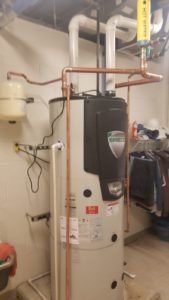 The winter months are the hardest on your plumbing, and the water heater is no exception. During cold weather water entering your water heater can be up to 25 degrees cooler than it is during the warmer months. This colder water, along with the fact that homes naturally use more hot water in cold weather means the water heater has to work harder to keep the water hot. This can result in the need to repair or replace the heater. Here are a few common issues you may face when the temperatures drop.
The winter months are the hardest on your plumbing, and the water heater is no exception. During cold weather water entering your water heater can be up to 25 degrees cooler than it is during the warmer months. This colder water, along with the fact that homes naturally use more hot water in cold weather means the water heater has to work harder to keep the water hot. This can result in the need to repair or replace the heater. Here are a few common issues you may face when the temperatures drop.
Pre-winter checklist for your water heater
If you notice your hot water is lukewarm in the winter, check its thermostat. If it’s at 120 degrees, you can raise the temperature in five- to 10-degree increments. Don’t go past 140 degrees (and be careful even going that high); this can result in scalding. If it doesn’t fix the problem, you could be experiencing the following problems:
-
Poor insulation. Either the piping leading into the tank or the tank itself may not have sufficient insulation. This results in significant heat loss, which can really strain your water heater. Foam insulation can be wrapped around the pipes and the heater can be fitted with a special jacket to prevent as much heat loss as possible. If you’re already properly insulated, but the area the water heater is in is very cold (such as in a garage or basement), try to eliminate drafts to keep it warmer. This can have a tangible effect on your water temperature.
-
Sediment buildup. As time passes, minerals and sediment build-up at the bottom of the water heater. This sediment actually absorbs the heat your water heater is producing, and it is wasted. We recommend you flush your hot water tank once a year to prevent buildup.
-
Faulty components. On average, we suggest you replace your water heater every eight to 12 years. If your system is getting older, faulty components could drastically reduce the energy efficiency of the equipment. Issues range from broken dip tubes, thermal switches, thermostats or heating elements (in electric water heaters). Allowing the water heater to further deteriorate is a bad idea, so get it looked at as soon as you notice a problem.
If you’re having trouble diagnosing the issues, you should contact us today to schedule an inspection from one of our certified, professional plumbers. Water heaters can be dangerous, and amateurs shouldn’t tamper with them.
Bieg Plumbing is one of the most trusted plumbing companies in St. Louis, and we have served the area for nearly six decades. Throughout the years we have seen (and fixed) everything imaginable. Everyone deserves a hot shower during the cold winter months, so if you’re not getting the temperature you need from your water heater, call in the red truck.

